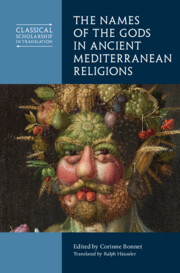Book contents
- The Names of the Gods in Ancient Mediterranean Religions
- Classical Scholarship in Translation
- The Names of the Gods in Ancient Mediterranean Religions
- Copyright page
- Dedication
- Contents
- Figures
- Tables
- Contributors
- Acknowledgements
- Foreword
- Abbreviations
- Introduction In the Mirror of Vertumnus
- Chapter 1 ‘To the Immortals Everything Is Possible’
- Chapter 2 All Sides of the Moon
- Chapter 3 ‘May the Force Be With You!’
- Chapter 4 Dionysos in the Mirror of Poseidon
- Chapter 5 Lord of the Universe, the World and Eternity
- Chapter 6 This Is Not a Name
- Chapter 7 The Sword and the Patera
- Chapter 8 A Travelling Portrait
- Chapter 9 Pantheus, a ‘Total’ God in the Greek and Roman World
- Chapter 10 ‘I Will Be Who I Will Be’ (Exod. 3:14)
- Chapter 11 Golden Locks Among the Greeks, or the Hair Secrets of the Beautiful Apollo
- Chapter 12 Athena – Artemis
- Epilogue
- Bibliography
- Index
Chapter 2 - All Sides of the Moon
A Greek Incantation from Late Antique Egypt
Published online by Cambridge University Press: 23 February 2024
- The Names of the Gods in Ancient Mediterranean Religions
- Classical Scholarship in Translation
- The Names of the Gods in Ancient Mediterranean Religions
- Copyright page
- Dedication
- Contents
- Figures
- Tables
- Contributors
- Acknowledgements
- Foreword
- Abbreviations
- Introduction In the Mirror of Vertumnus
- Chapter 1 ‘To the Immortals Everything Is Possible’
- Chapter 2 All Sides of the Moon
- Chapter 3 ‘May the Force Be With You!’
- Chapter 4 Dionysos in the Mirror of Poseidon
- Chapter 5 Lord of the Universe, the World and Eternity
- Chapter 6 This Is Not a Name
- Chapter 7 The Sword and the Patera
- Chapter 8 A Travelling Portrait
- Chapter 9 Pantheus, a ‘Total’ God in the Greek and Roman World
- Chapter 10 ‘I Will Be Who I Will Be’ (Exod. 3:14)
- Chapter 11 Golden Locks Among the Greeks, or the Hair Secrets of the Beautiful Apollo
- Chapter 12 Athena – Artemis
- Epilogue
- Bibliography
- Index
Summary
A Greek hymn is selected among other examples in the corpus of Greek ‘magical’ papyri written in Egypt during the Roman Imperial time. Addressed to the Moon goddess in a plurality of forms and names, it draws a complex portrait of a powerful divinity for love affairs. The incantation weaves innovative denominations together with a poetic and ritual tradition in order to enact power. The poet realised a technical ‘tour de main’ to picture a many-faced goddess, tying heavenly and shining traits to the gloomiest and the deadliest, and entangling anthropomorphic characteristics to a patchwork of animal features. The poetic mastery over names and figures offers tools for the making of the divine inside the ritual performance, with the effect of rendering a vivid perception of the Moon goddess encompassing all her aspects.
- Type
- Chapter
- Information
- The Names of the Gods in Ancient Mediterranean Religions , pp. 37 - 58Publisher: Cambridge University PressPrint publication year: 2024

